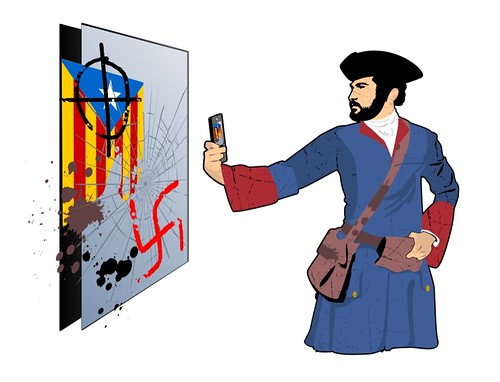A lot of the time when I explain what it's like to live under the Spanish government, I get the feeling that people think I exaggerate. It couldn't really be that bad. Those Catalan nationalists have you brain washed. That sort of thing. Sometimes I even wonder myself if I haven't fallen down the rabbit hole. But then the Spanish State does something else to remind you that actually, it *is* that bad.
So, it turns out that this very famous and not particularly political guy named Albert Sánchez Piñol wrote a book called
Victus which was published in Spanish and Catalan two years ago. Though he's known for his writing in Catalan, he explains that he wrote
Victus in Spanish because it felt more natural for the subject material. He got a fair bit of flack for it, truth be told. The book is about the fall of Barcelona in 1714, which marked the loss of Catalonia's sovereignty.
Anyway, Piñol presented the Dutch translation of his book at
Spui 25, an academic-cultural center in Amsterdam on Wednesday. According to
Marti Estruch, who works at DiploCAT a public diplomacy council which helped finance the book's translation into Dutch, and who was present, the discussion was widely attended by locals, and focused on the historic backdrop, the narrator's voice, the characters that appear in the book. Estruch then
describes how at the end of the discussion, a woman got up:
"Everything was happy and rolling along until a woman in the back row (
later identified as Luisa Sánchez-Bravo Carretero), who hadn't stopped taking notes throughout the event and who had also brought some prepared documents from home, asked to speak. She identified herself as the First Secretary of the Spanish Embassy at The Hague and gave a long speech in which she put in doubt the historical truthfulness of the events narrated in 'Victus', because, according to her, in Catalonia there were also many people who loved the Bourbons, beyond just the elites. She also insisted that El Decret de Nova Planta [the decree that abolished Catalan institutions] had been a very modern law. About the current situation, she explained that Spain is a modern, consolidated democracy and that the Catalans don't have any right to decide their own future by themselves. Finally, several Dutch people interrupted her and asked her to be quiet, saying that this was the question and answer period, and not the moment for political discourse."
But that was just the prelude. According to the translator of the book into Dutch, Adri Boon, who was interviewed on
El món a RAC1, the Director of the Instituto Cervantes—a Spanish government organization which promotes Spanish culture throughout the world—in Utrecht called him the next morning
to cancel the presentation scheduled at the institute Thursday afternoon. Boon says the Institute's director, who happens to be Catalan, said that the fault was hers for having scheduled the event, and that if the translation was related to DiploCAT, it was better that the institute not be involved."
The publisher of the Dutch edition of 'Victus',
Juliette Van Wersch was furious,
tweeting (in Dutch) "Sorely disappointed "@Signatuur: reading of Albert Sánchez Piñol's novel Victus called off http://t.co/RCHDCYYpOZ". "This is a serious matter that tends toward censorship," Van Wersch told
NOS, a Dutch news portal. "It is shocking that on Dutch soil, where freedom of speech is a great thing, that a public conversation between an author and his translator is boycotted from abroad," Van Wersch was quoted in
INSpanje.nl.
On the Institut Cervantes Utrecht website, they simply said that the event had been "
postponed". Neither a reason nor a future date was given. The
tweet that announced the postponement was published at 11:54 am, just 7 hours before the event was to begin. On Friday, the Cervantes Institute's Communications director, Herando Fernández Calleja
confirmed that it was the "Spanish embassy itself who communicated the event's postponement". He also mentioned the fact that a Catalan pro-independence flag had been displayed at an event in New York City on June 4th.
Dutch press described the actions of the Spanish Embassy with headlines like "
Spanje verbiedt lezing in Utrecht" [Spain bans lecture in Utrecht] and
"Spaanse ambassade blaast lezing Sánchez Piñol af" [Spanish Embassy blows off Sánchez Piñol reading], and it was later covered on Dutch TV.
Marieke Niezen, head of marketing for AW Bruna, said "
The lecture is not moved to a different time or a different location, the timing was too short for that."
This is not the first time the Spanish government has been accused for censoring Catalan speech abroad. Spain's Foreign Affairs Minister José Manuel García-Margallo,
admitted that there were political motives behind not renewing Clara Ponsatí's chair as a visiting professor of Economics at Georgetown University. Ponsatí says she had never spoken about Catalan independence in her classes. The Spanish government moved after she participated in a discussion on
Al Jazeera TV.
A debate on the Catalan sovereignty process
was canceled at the last minute at the prestigious Brussels think tank, Centre for European Policy Studies (CEPS) in June.
And
Margallo admitted that he tried to keep Catalan pundit Pilar Rahola from speaking in Ecuador, at an event that had nothing to do with Catalonia: an event commemorating Israel's 66th anniversary. Rahola
revealed the pressure and attempted censure in an editorial last May.
Note that the English edition of
Victus is to be published in the United States by Harper Collins on September 9th. I don't know if they have scheduled any events at the Instituto Cervantes in New York, but perhaps they should start looking for a new venue.

